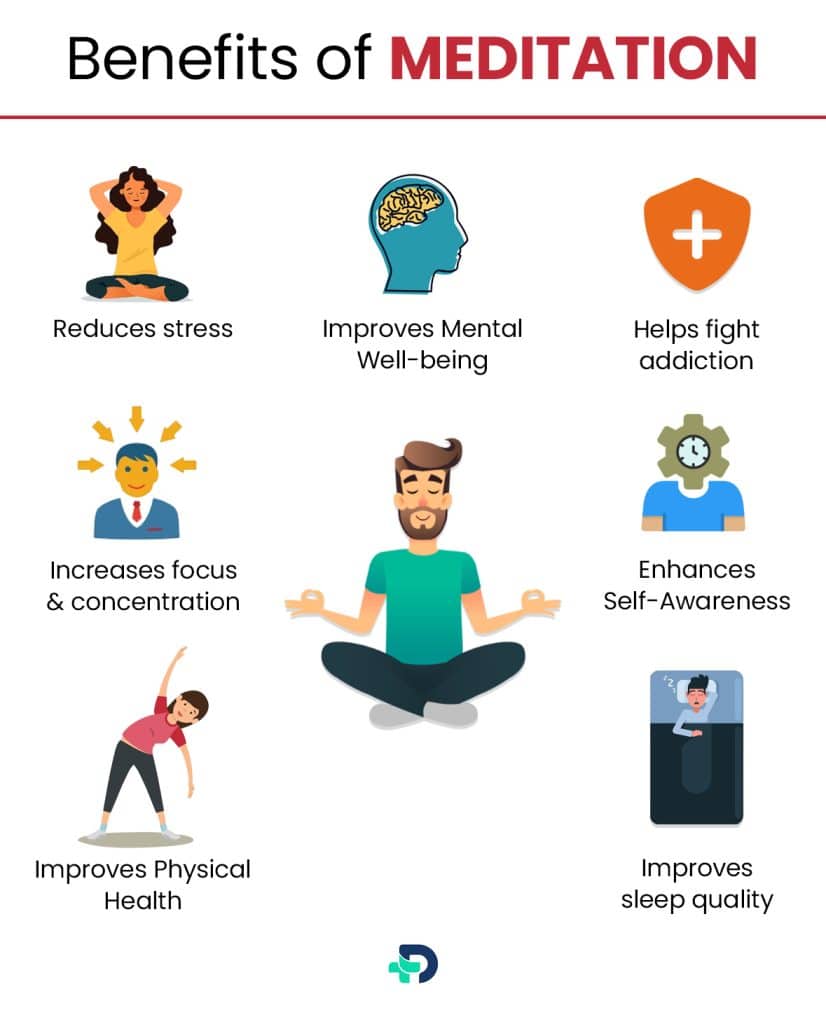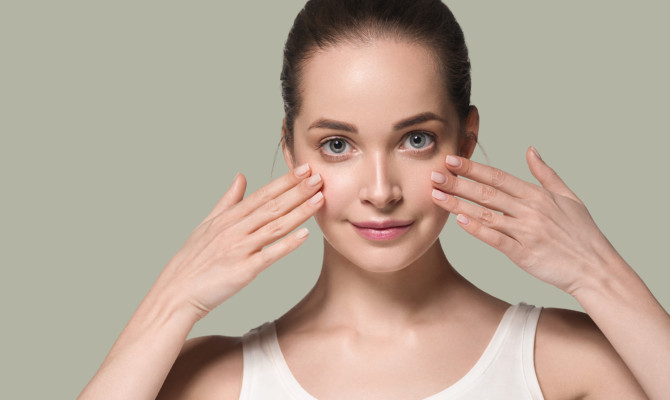Benefits of Meditation

- Meditation
- 17 Aug 2023
Overview
What is Meditation?
Finding moments of quiet and inner peace in today’s fast-paced society, where anxiety and stress frequently rule our lives, has become critical. Meditation is a discipline that originated thousands of years ago and is growing in popularity as people learn about its health benefits. Meditation is, at its foundation, a scientifically established technique to teach the mind to concentrate and redirect thoughts, which eventually leads to an enhanced state of consciousness and inner clarity.
In this article, we will look at what meditation is and its health benefits, how it is done and how it works, various types of meditation, and ways to incorporate it into our daily lives.

Types
Types of Meditation
There are many types of meditation, including:
- Mindfulness meditation.
- Transcendental meditation.
- Guided visualization.
- Loving-kindness meditation.
- Breath awareness meditation.
- Spiritual meditation.
- Movement meditation.
- Mantra meditation
- Progressive relaxation
Mindfulness meditation
- This practice involves concentrating on the present moment while objectively monitoring thoughts and feelings.1Types| Researched based study from Nih.gov
- It has been demonstrated to improve focus, resilience, and emotional well-being while reducing stress, anxiety, blood pressure, and depression symptoms.
Transcendental Meditation (TM)
- This entails using a mantra, which is a specific sound or word, to relax the mind and attain deep relaxation.2Types| Researched based study from Clevelandclinic.org
- According to research, TM lowers blood pressure, improves heart health, and increases general well-being.
Guided visualization
- This meditation technique is mentally visualizing tranquil and positive images or events.3Types| Researched based study from Nccih.nih.gov
- It can induce relaxation, improve imagination, and decrease anxiety and stress by establishing a mental refuge of quiet and tranquility.
Loving-Kindness Meditation
- This meditation practice develops feelings of empathy, love, and closeness by focusing on fostering kindness and compassion towards oneself and others.4Types| Researched based study from Berkeley.edu
- It can boost self-esteem, alleviate bad feelings, and promote harmonious relationships.
Breath Awareness Meditation
- This meditation approach focuses entirely on the breath, monitoring the process of inhaling and exhaling without seeking to control or affect it.
- It improves focus, decreases mind wandering, generates a sense of calm and centeredness, and relieves headaches.5Types| Researched based study from Artofliving.org
Spiritual meditation
- It can be done at home or in a place of worship and is found in almost every religion and spiritual tradition.
- It can help those who want to connect with a higher power or spiritual force.6Types| Researched based study from Uh.edu
Movement meditation
- This is an active style of meditation in which participants are guided toward the moment and have a deeper connection with their bodies through movement.
- Examples include yoga, gardening, strolling meditation, tai chi, and other similar activities7Types| Researched based study from Nlm.nih.gov
Mantra or chanting meditation
- A repeating sound, such as a word, phrase, or sound, is used to calm the mind. “Om” is among the most commonly utilized sounds8Types| Researched based study from Nlm.nih.gov
- It can improve self-awareness, reduce stress, increase calm, regulate heart rate, drop blood pressure, strengthen immunity, and encourage positive thinking9Types| Researched based study from Eocinstitute.org
Progressive relaxation or body scan meditation
- This meditation technique involves gently tightening and releasing a single muscle group at one point throughout the body and it helps to decrease tension and relax a person before bed3Types| Researched based study from Nccih.nih.gov
Practice
How to Meditate?
Meditation can be done in a several ways, but the basic uses remains the same:
- To relax the mind.
- Develop a sense of inner peace.
Here’s a step-by-step method for practicing meditation
- Locate a peaceful and comfortable location – Choose a quiet location where you can sit or lie down without being distracted.
- Maintain a relaxing posture – sitting with your legs crossed on a mat, cushion, or chair with the spine straight. Alternatively, if lying on your back helps you relax while keeping attentive, do so10Practice| Researched based study from Nhs.uk
- Focus on your breath – by breathing deeply with closed eyes and focusing on the natural rhythm of your breath. Allow any other thoughts or anxieties to fade away as you focus exclusively on the sensation of breathing.
- Cultivate mindfulness – by acknowledging thoughts without judgment and gently returning your attention to the breath when they occur during meditation. Being mindful entails being present in the moment and monitoring thoughts and sensations without becoming engrossed in them.
- Choose a meditation style – Depending on your preferences and intentions, you can try mantra meditation, loving-kindness meditation, mindfulness meditation, or transcendental meditation. Each technique has a distinct focus and set of advantages.
How Does Meditation Work?
- Meditation has a significant effect on both the mind and the body.
- It includes using several methods to bring about deep relaxation and concentration.
- Regular practice results in a beneficial shift in activity in the brain, changing how our brain interprets information and decreasing the responsiveness of the amygdala, our brain’s fear and stress center.
- It activates the prefrontal cortex, which is responsible for focus, making decisions, and emotional control.11Practice| Researched based study from Nlm.nih.gov
- Meditation also activates the parasympathetic nervous system, causing a relaxation response and lowering the production of stress chemicals like cortisol12Practice| Researched based study from Uwmedicine.org
- This results in deep relaxation, greater emotional well-being, and improved general health.
Benefits

Benefits of Meditation
Meditation offers many physical, mental, and emotional health benefits. Some notable advantages include:
- Reduces stress.
- Improves Mental well-being.
- It helps fight addiction.
- Increases attention and concentration.
- Enhances self-awareness.
- Improves physical health.
- Reduces age-related memory loss.
- Improves kindness.
- Improves sleep quality.
Reduces stress
- Meditation is a powerful cure to stress because it promotes relaxation, reduces stress hormones, and promotes mental and bodily calmness.13Benefits| Researched based study from Nlm.nih.gov
Improves Mental Well-being
- Anxiety, despair, and unpleasant emotions can all be reduced with regular meditation practice13Benefits| Researched based study from Nlm.nih.gov
- It boosts mental toughness, positive thinking, and inner peace and fulfillment.
Helps fight addiction
- Meditation increases psychological awareness and can aid in managing triggers for undesired impulses.
- This can help patients overcome addiction, control unhealthy eating patterns, and divert other unwanted behaviors14Benefits| Researched based study from Nccih.nih.gov
Increases focus and concentration
- Meditation improves focus and cognitive abilities by training the mind to be present and minimizing distractions13Benefits| Researched based study from Nlm.nih.gov
- It boosts memory, attention span, and mental clarity.
Enhances Self-Awareness
- Meditation encourages self-reflection and introspection, which allows people to have a greater awareness of themselves, their ideas, and their emotions.15Benefits| Researched based study from Frontiersin.org
Improves Physical Health
- Numerous research indicates that meditation has advantages on physical health.
- It can decrease blood pressure, heart rate, enhances immunity, and helps relieve pain.13Benefits| Researched based study from Nlm.nih.gov
Reduces age-related memory loss
- Regular meditation may improve memory and clarity of thought by enhancing your focus and also helps in the battle against dementia and memory loss due to age13Benefits| Researched based study from Nlm.nih.gov
Improves kindness
- It also boosts cheerfulness, empathy, and compassion toward others.
Improves sleep quality
- Meditation can help people relax and manage distracting thoughts, lowering the time it takes to fall asleep and improving sleep quality14Benefits| Researched based study from Nccih.nih.gov
Tips
Tips to make Meditation an everyday routine
Including meditation in your daily practice can be a transformative and a relaxing experience. Here are some pointers to help people develop a regular meditation practice –
- Start with a reasonable goal – Begin with small sessions of 5-10 minutes and progressively increase the duration as you gain confidence. Consistency is crucial, so try to meditate daily, even for a few minutes.
- Choose a suitable time – The least disruptive time of day should be your choice. Many individuals like early mornings or evenings for meditation, but choose a time that works with your schedule and energy levels.
- Dedicate a space – Set aside a nice and quiet area for your daily meditation practice and decorate it with calming elements like scented candles or a diffuser, cushions, or significant objects.
- Be patient and do not judge yourself – Recognize that learning to meditate requires practice. Allow yourself to be patient. Let go of any expectations or judgments that may occur during your training.
- Be gentle on yourself – Some people occasionally fall asleep during meditation at their initial stages, which is not an indication of failure but tiredness.
- Seek help if necessary – Consider joining a meditation group or consulting a meditation teacher or app. These tools can help you by providing structure, support, and valuable insights.
Bottom line
The Bottom Line
Meditation is a powerful ancient technique that can help people achieve inner calm, serenity, and overall well-being. By adopting meditation into one’s everyday life, one can reap various advantages, including stress reduction, improved mental and physical health, and increased self-awareness and attention. It is good to accept meditation as an art form for its power and embark on a path of self-discovery and inner harmony.
Any feedback on this article?
 This Articles content was accurate
This Articles content was accurate Very Informative Article
Very Informative Article I have a question or a comment
I have a question or a comment
 This article contains inaccurate content
This article contains inaccurate content This article was not helpful
This article was not helpful I have a question or a comment
I have a question or a comment
We appreciate your helpful feedback!
Checkout our social pages
References
-
National Institutes of Health
Mindfulness for Your Health The Benefits of Living Moment by Moment | Types
-
Cleveland Clinic
Transcendental Meditation(R) | Types
-
National Center for Complementary and Integrative Health
Relaxation Techniques: What You Need To Know | Types
-
Greater Good Science Center at UC Berkeley
Loving-Kindness Meditation | Types
-
Art of Living
This 5 Minute Breath Awareness Meditation Can Reduce Your Daily Stress | Types
-
University of Houston
LET'S LEARN ABOUT SPIRITUAL MEDITATION | Types
-
National Library of Medicine
Meditative Movement for Depression and Anxiety | Types
-
National Library of Medicine
Meditation on OM: Relevance from ancient texts and contemporary science | Types
-
EOC Institute
The Benefits Of Using A Mantra In Meditation | Types
-
National Health Service
How to meditate for beginners | Practice
-
National Library of Medicine
Hemodynamic responses on prefrontal cortex related to meditation and attentional task | Practice
-
UW Medicine
How Meditation Affects Your Brain and Boosts Well-Being | Practice
-
National Library of Medicine
Meditation: Process and effects | Benefits
-
National Center for Complementary and Integrative Health
Meditation and Mindfulness: What You Need To Know | Benefits
-
Frontiers Media S.A
Self-awareness, self-regulation, and self-transcendence (S-ART): a framework for understanding the neurobiological mechanisms of mindfulness | Benefits
































